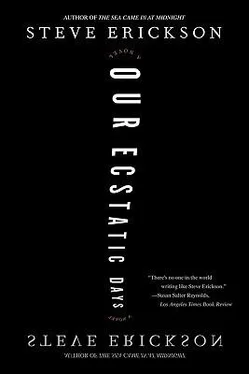Running her fingers along the wall, Sara has her ear pressed to it, listening.
glad for Kirk’s nightmares, part of me was glad for Kirk calling to me in the
Now that the girl thinks about it, the baby thing and the whole business of listening to sick buildings, they started about the same time. It’s a bit cracked isn’t it? she thinks. Sara who’s otherwise so supremely composed and logical — what’s it really about anyway? A melodramatic affectation to justify a pretentious profession that’s just highly lucrative listening at its most harmless and, at its most intrusive, a violation of the psyche’s inner machinery some semanticist was on to something, the girl muses to herself, when she introduced to each other the words “the” and “rapist.” At this moment of crisis between them, the girl wonders if Sara is having a breakdown of some sort, if listening to women’s voices in walls is the first fracture in the imperturbable façade of a woman who’s made indominability an identity. Watching Sara now the younger woman is about to ask, Isn’t this the sort of thing they do on the West Coast? but says instead, “Don’t tell me this building is dying.”
But she’s never seen a look like this on Sara’s face before, the look she has now, not ever. It actually frightens the girl, makes her back away from the other woman; and she realizes one of the things she’s loved Sara for is the promise that she’ll never have on her face a look like this. Sara answers, something in her voice, “Let’s go home.”
The girl finds it in herself to insist, “I’m going up.”
Sara steps toward her in the dark. “Let’s go home,” she says again, a tension in her voice the girl has never heard. Backing away from the wall, Sara looks up: “Come home with me now,” like a mother — and the younger woman can’t stand it. No more mothers, she thinks, I’m done with mothers and that includes ever being one;
night from his crib Mama? as though he feared I was the thing missing from
and she turns where she stands, “I’m going up,” and clutching her radio weaves her way through the concentric rings of symmetrically staggered stone benches surrounding the enormous fountain. I’m going up she keeps telling herself, listening for the other woman’s footsteps behind her and, when she doesn’t hear them, almost turning to look. But there’s no point to it. I’m not going back. Either Sara is still back there at the wall waiting for me or she’s gone, but either way — The girl sees the dark form of someone sitting at the edge of the fountain in the waning light of a moon that’s halfway between menstruation and fertility; at first she thinks perhaps it’s him. “I want to go up,” she says before realizing it’s a stranger to whom her instinctive response is the same as always, pulling her coat closer to cover and protect herself. A stranger: the ghost of someone she’s supposed to have known, she thinks, when he says so quietly and invisibly in the dark it could almost be the fountain speaking, “The Age of Chaos is here.”
Jeez, it is getting to be like the West Coast ’round this place. “What?” she says but doesn’t wait for him to repeat it; now she does turn back to look, but Sara is gone. Unsettled, the girl stumbles off into the shadows of the square: It was ridiculous to think I might just wander ’round and run into him; I had no idea it was so big. Probably it was never a serious offer anyway, a polite gesture of thanks to a young researcher in the uptown university library who agreed to help in a wild goose chase. Probably he was just hitting on me? — even if a girl develops an instinct for such a thing and, instinctively, she doesn’t think so. Now it all appears so preposterous, doesn’t it. So it seems something of a miracle when, there in the other building’s outer lights, he says, “Hello,” just as she’s practically broken into a frightened sprint. “Oh,” she says.
his world, as though his very life might grow into the answer to the question I
“Are you all right?”
She gazes over her shoulder at the fountain behind her. “I, uh … I’m a bit surprised I found you.”
“I wasn’t expecting you.”
“I know. It’s late. Impulse. Spontaneous and all.”
He’s a man who’s spent half a life meditating on the laws of impulse, only to reject them. “Did you want to go up?” he says.
“Can we? Still?”
He says nothing but motions her to follow. They circle around the corner of the building to a side door he opens with a key from a ring of more keys than she’s ever seen; closing the door behind them, he turns on a light in a concrete stairwell and they make their way through two more doors until they’re inside crossing the dim lobby. He stops for a moment, mulling.
She almost asks, Is something wrong? and then, I’m sorry, it’s so late, this is an imposition — but really her thoughts already have returned to Sara. In her head she keeps seeing Sara listening to that wall outside, then Sara gone and the wall empty. On the other side of the lobby, at a row of elevators, the man unlocks one. Looking around at all the flags she absently wonders how he knows which key goes to which elevator; she says, Do you live here? and he says, In the elevator? and she answers, No — and then realizes Oh, it’s a joke. He makes jokes. I keep a little room
had carried inside me, part of me was glad he was having his nightmares of
with a cot, he explains, although I’m not supposed to, “they don’t know,” nodding at the omnipresent they outside. Seeing him for the third time, after twice at the library, she finally notices he’s good looking. More attuned as she is to the looks of women, she finds the phenomenon of lovely men interesting in the abstract — something she sometimes notices even before straight women, who often are distrustful of and on their guard against lovely men. She has the luxury of being awed by such men; she makes a conscious effort not to look at his hand. How many are there? she asks, and he says what? and she says elevators, and he says a couple hundred, more or less, between the two buildings, counting the freight lifts; he’s not exactly sure. The Emperor of Elevators, she says, and when he doesn’t immediately respond is mortified: was that a slur? she wonders. Is it the Japanese or Chinese who have an emperor?
She’s not sure which he is anyway. She’s thinking frantically when he nods, “The Emperor of Elevators,” with that slight smile; he seems genuinely amused. “It’s an aversion to ground-level,” he elaborates. In the elevator she’s warm in her light coat and almost takes it off, and checks herself: a self-conscious pair we would be, she thinks, me trying not to look at his hand and him trying not to look at my tits; but she does free from her coat her long gold hair that’s been tucked under. “You should be a pilot,” she suggests.
“That would be an aversion to gravity,” he answers, “which is different.” Staring at the ascending numbers above the doors, he says firmly, “The square outside, for instance: I don’t like it.” After they’ve gone seventy or so floors, changing elevators on one of the sky lobbies, she says, “I’m sorry I haven’t had any luck finding what you’re looking for.”
the lake or lost monkeys, because it meant at least he was dreaming and
“It’s all right,” he answers. “I didn’t give you much to work with.”
“I’ve done a search on everything before and up through June ’89, for anything with ‘higher light’ or, in case you misunderstood, ‘higher life.’ You’re sure none of the ones I’ve found is—”
“I’m afraid not.”
“It’s not some sort of hymn, or gospel—”
Читать дальше











